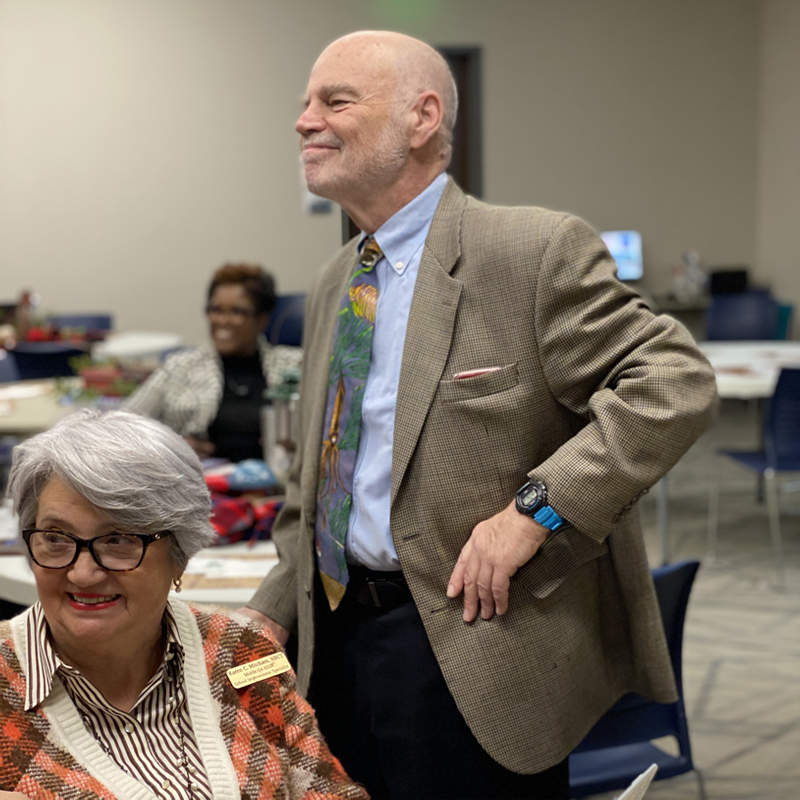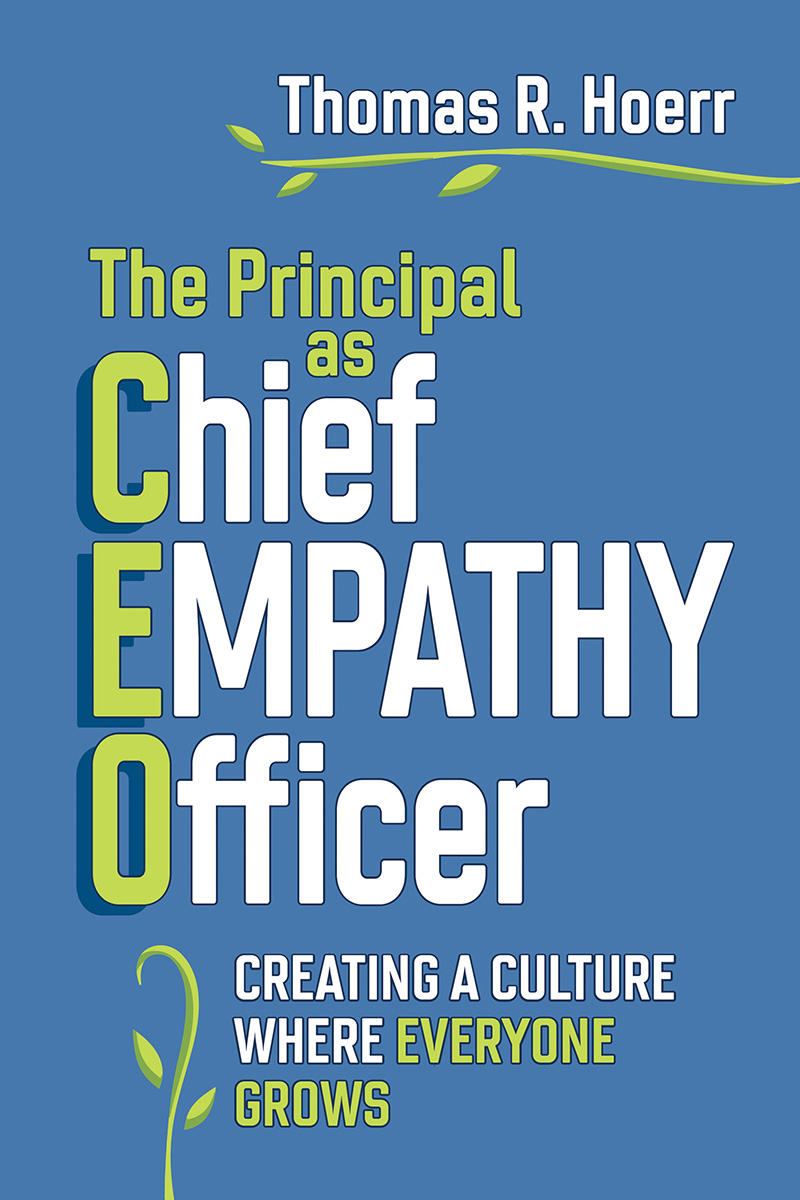
Consulting & Presentations
Tom Hoerr is an educator, author, and presenter. Whether giving presentations at conferences, working with trustees on issues of governance or planning, or teaching prospective principals or new heads of school, Tom facilitates problem-solving. His presentations are engaging, interactive, and constructivist; he leads participants in making meaning.
If you are interested in inviting Tom to present to your organization or group, please email him at trhoerr@newcityschool.org.
Recent presentations that Tom has given include:
Keynote: The Formative Five - Fostering Grit, Empathy, and Other Success Skills Every Student Needs
For success in school and life, students need more than proficiency in academic subjects and good scores on tests; those goals should form the floor, not the ceiling, of their education. To truly thrive, students need to develop attributes that aren’t typically measured on standardized tests. In this keynote, educators will get an overview on how to foster the “Formative Five” success skills that today’s students need, including empathy, self-control, integrity, embracing diversity, and grit.
As an extension to the keynote, Dr. Hoerr will engage participants more deeply in the Formative Five:
- Empathy: learning to see the world through others’ perspectives.
- Self-control: cultivating the abilities to focus and delay self-gratification.
- Integrity: recognizing right from wrong and practicing ethical behavior.
- Embracing diversity: recognizing and appreciating human differences.
- Grit: persevering in the face of challenge.
When educators engage students in understanding and developing these five skills, they change mindsets and raise expectations for student learning. As an added benefit, they see significant improvements in school and classroom culture. With specific suggestions and strategies, this session will help teachers, principals, and anyone else who has a stake in education prepare their students—and themselves—for a future in which the only constant will be change.
When we look at who succeeds in the world – however we define success – it is clear that doing well in school is only a portion of what is needed. Students do need to be prepared scholastically but that should be the floor, not the ceiling. Preparing students for success in life, not just focusing on success in school, means that we need to help them develop grit. In this presentation, Dr. Hoerr will help us analyze grit and show the steps we can take to make our schools and classrooms more conducive to teaching it. Participants will have time to develop their own strategies for supporting grit.
Old forms of authority and “command and control” lines of authority don’t work in the twenty-first century. People follow their leaders because of the confidence and trust that they give to them, due to the relationships that have been developed. Leadership is an art, built on relationships, and good principals use those relationships to create a culture of faculty collegiality in which everyone learns and grows. Principals need to understand curriculum and instruction but those are not the most important keys to the leadership puzzle! In this workshop, we will look at individual power and assess our own power bases, and focus on strategies to use in building school climate, creating faculty collegiality, goal-setting, and parent communication.
Sometimes we take our school’s culture for granted, just as a fish may not be aware of water. People perceive, act, and react because of the culture. Whether culture is formed intentionally as part of a plan, or is more organic, stemming from particular practices and traditions, it frames the attitudes, expectations, and behaviors of everyone in a school – students and adults alike. Culture is more powerful than plans, strategies, rules, or regulations. In this presentation, Dr. Hoerr will work from John Coleman’s model of culture (vision, values, practices, people, narrative, place). He will cause us to reflect on the culture in our schools and will share some ideas and strategies that he has used to help students to learn and teachers to grow.
How do school leaders prepare for and respond to racial incidents in their larger communities? Sadly, the tragedy and aftermath in Ferguson, MO could have taken place anywhere in our country. And if something like this happens near you, it will have an impact upon and in your school. In this presentation, Dr. Tom Hoerr – his school is 20 minutes from Ferguson – will share how he and his faculty responded to the death of Michael Brown and what he had done beforehand to help create a setting that celebrated a diversity of diversities.
Roland Barth’s model of collegiality – a school climate in which teachers learn with and from one another – is the most important factor in determining the quality of a school. If we want students to grow and learn, the adults must grow and learn too. And yet as simple as this sounds, this kind of collegiality is difficult to achieve. Dr. Hoerr will explain the components of collegiality, how it is different than yet is built upon congeniality, and share strategies for how to pursue them. Participants will have time to develop a plan for building collegiality in their schools.
The theory of Multiple Intelligences (MI) conceived by Dr. Howard Gardner derives from the fact that intelligence is problem-solving and there are many different ways to solve problems. Unfortunately, too often schools only offer narrow pathways for students to learn; students whose strengths match the curricular expectations do well, while others find school a place that is not inviting. Under Dr. Hoerr’s leadership, the New City School in St. Louis began using MI in 1988, and Dr. Hoerr has played a leadership role in that thrust and in showing other educators how to use MI. In this session, Dr. Hoerr will help us examine the various models of intelligence and share strategies that teachers and principals can use in bringing MI into their schools.
The days when leaders could get things done by “command and control” are gone, and that’s even more the case for leaders who are not the principal or head of school. Leadership at all levels is an art, built on relationships, and good leaders use those relationships to create a culture in which everyone learns and grows. In this workshop, Dr. Hoerr will talk about leadership and leadership styles, and help participants look at how we influence others and get things done. Individual power and school culture will be examined.
The quality of a school’s governance can have a tremendous impact on the school’s success. This governance workshop begins by focusing on the responsibilities of the board of directors and how boards can work collaboratively with the head/executive director. This includes determining the areas in which a board should work and those that are designated-only to administrators. Too often boards replicate the work of administrators, and that serves no one well. Dr. Hoerr’s goal is to ensure that boards frequently operate in a “generative” manner, getting beyond questions of what and how, and taking the time to ask “Why?”

